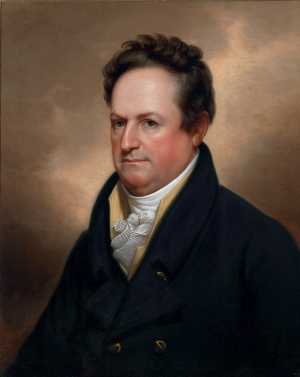 SKC Films Library |
| SKC Films Library >> American History >> United States: General History and Description >> Revolution to the Civil War, 1775/1783-1861 >> Early 19th Century, 1801-1845 >> Individual Biography, A-Z |
| De Witt Clinton U.S. Senator, Mayor of New York City, Governor of New York, advocate for building of the Erie Canal
De Witt Clinton was born in Little Britain, New York, on March 2, 1769. He was educated at Kingston Academy and Columbia College (now Columbia University), after which he studied law for three years; he was admitted to the New York Bar in 1790. He became private secretary to his uncle George Clinton, who was then Governor of New York, and served in that capacity from 1790 until 1795. Clinton officially entered politics in 1797, when he was elected to the New York State Assembly. In 1798 he moved up to the State Senate, and served there until 1802, when he was appointed to fill the U.S. Senate seat vacated by the resignation of John Armstrong, Jr. During his tenure in the Senate he initiated the legislation which ultimately led to the 12th Amendment to the U.S. Constitution, which changed the manner by which the President and Vice-President are elected. In 1803, Clinton resigned from the Senate to become Mayor of New York City. With the exception of two one-year terms, he would go on to serve in this position until 1815. As mayor, Clinton organized the Public School Society, served as chief patron of the New York City Hospital and New York Orphan Society, secured a charter for the New York Historical Society, and founded the New York Literary and Philosophical Society. During this period he also served in the New York Senate (1806-1811) and as Lieutenant Governor (1811-1813). In 1812, the Federalist Party nominated Clinton for the presidency, but he lost the general election to incumbent President James Madison. In 1817, a Republican caucus nominated Clinton to fill the Governor's seat vacated by the resignation of Daniel D. Tompkins, who had been elected Vice-President. He was elected by an overwhelming majority, and re-elected in 1820, but lost support because of internal dissension within the party and refused to run again in 1822. Since 1810 Clinton had been a member of the New York Canal Commission and had been actively promoting a state-funded canal between the Hudson River and Lake Erie. In April 1816, the State Legislature finally adopted his plan, which carefully outlined engineering problems and procedures, financial necessities, and the commercial potential of such a canal. In 1824, however, a group headed by U.S. Senator Martin Van Buren removed him as canal commissioner. In response to Van Buren's actions, the Anti-Regency Party nominated Clinton for the governorship, which he won easily. In 1825, Governor Clinton had the satisfaction of presiding over the opening of both the Champlain Canal and Erie Canal. He died in office on February 11, 1828. SOURCE SEE ALSO |
| SKC Films Library >> American
History >> United States:
General History and Description
>> Revolution
to the Civil War, 1775/1783-1861
>> Middle
19th Century, 1845-1861
>> Individual
Biography, A-Z This page was last updated on March 01, 2018. |
